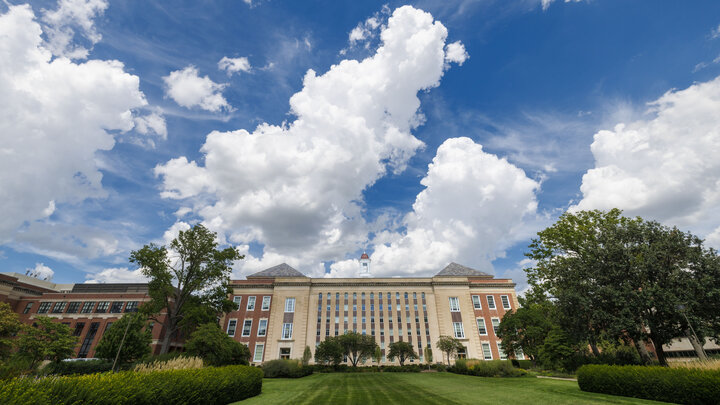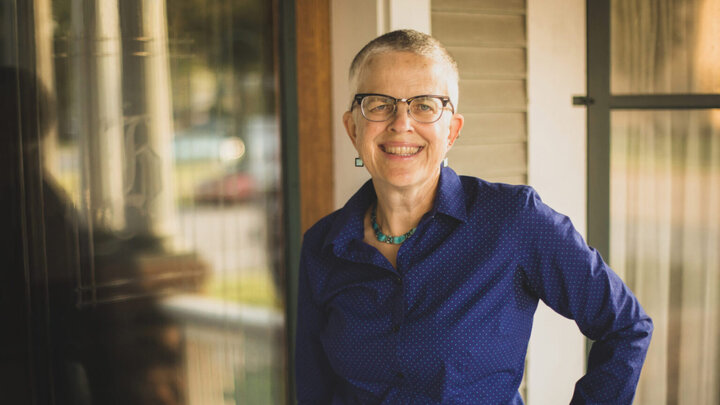Faculty in the College of Arts and Sciences are leading or collaborating on projects funded by Grand Challenges awards.
The Grand Challenges initiative represents a commitment by the Office of the Chancellor and the Office of Research and Innovation to strategically invest funds earmarked for research.
Details are available on Nebraska Today and the Grand Challenges website.
Catalyst Award
Advancing Development of Assessments, Practices and Tools (ADAPT) to Produce Climate Smart Beef in Grazing Systems
A Grand Challenges award will bolster the university's efforts to support a sustainable beef industry, which researchers believe is crucial from an environmental, economic and social standpoint.
Additional CAS Faculty Collaborators
- Co-PIs/Team Lead: Effie Athanassopoulos, anthropology
- Project Evaluation: Mario Scalora, psychology, University of Nebraska Public Policy Center
Transforming Environments: Promoting Children's Health, Development and Learning Indoors, Outdoors and Beyond
Julia Torquati, Sarah Karle, Holly Hatton, Jennifer Leeper Miller, Salvador Lindquist, Anne Schutte, Nicholas Hubbard, and Katie Krause.
Increasing studies suggest that physical environments — especially green spaces — are essential to young children's health and well-being. But even in Nebraska, with its abundance of open spaces, there are disparities in who has access to the natural world for play and exploration. In low-income communities, for example, "built" environments are often more prevalent than green spaces.
Led by cognitive development expert Anne Schutte (psychology) and landscape architect Sarah Karle, the project team aspires for every Nebraska child to have access to green spaces and environments that promote healthy development, especially in early childhood education and care settings. Many studies suggest that green-space exposure may lead to better outcomes for young children, including improved attentiveness, memory and emotional well-being.
The interdisciplinary team will establish a comprehensive community-based research program that integrates design, developmental science and educational outcomes to enhance children's daily environments. Using behavioral and physiological measures, plus neuroimaging, researchers will assess how physical environments impact development and well-being.
Leveraging Nebraska Extension's leadership in addressing complex issues at the local, state and national levels, the team will co-create solutions for Nebraska communities to enhance, improve and create healthy environments for young children and their caregivers. Working with the Early Childhood Health Outdoors program, the team will develop professional development resources to help educators incorporate green spaces — especially in communities with fewer resources. Researchers also will create experiential learning opportunities for College of Architecture students to learn how to design healthy indoor and outdoor environments, drawing upon research findings in psychology, architecture and education.
Additional CAS Faculty Collaborator
- Nicholas Hubbard, psychology; Center for Brain, Biology and Behavior
Planning Grant Awards
Planning grants support the teaming, ideation and development activities for teams to coalesce around one or more Grand Challenges themes and prepare a catalyst proposal.
"Education Landscape and Experiential Learning for Quantum Information Science and Technology Workforce Development"
Christine Kelley, professor of mathematics, will collaborate with Yanan (Laura) Wang, assistant professor of electrical and computer engineering, and Jordan Wheeler, assistant professor of educational psychology.
Additional CAS Faculty Collaborators
- Senior Personnel: Tefjol (Ollie) Pllaha, mathematics
- Advisory Board: Christian Binek, physics and astronomy
"Center for Arthropod Research, Education and Materials Innovation (CAREMI)"
Eileen Hebets, George Holmes Professor of biological sciences, and Nicole Sexton, assistant professor of biological sciences, will collaborate with Angela Pannier, Swarts Family Chair and professor of biological systems engineering.




